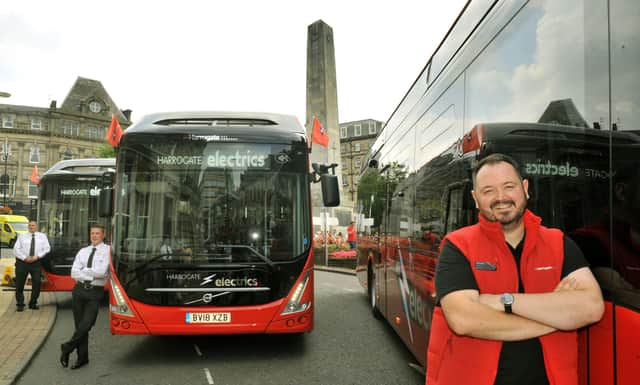OPINION: Government has set out a vision for public transport - Alex Hornby, Harrogate Bus Company


This document was introduced with the words ‘I love buses’ from the wine-box bus modeller himself Boris Johnson.
Before we go much further, it’s worth reflecting that having a statement with such a ringing and personal endorsement from any Prime Minster is surely no bad thing for an industry that has struggled with endorsement from government over the past year.
Advertisement
Hide AdAdvertisement
Hide AdThe vision, laid out by the Department for Transport, brings together many of the things we do already here in Harrogate, including zero emission buses, strong branding, comprehensive timetables, as well as things we don’t have - the call for bus lanes and other priorities to get our thousands of customers through the traffic.
It also permits authorities to consider the franchising of buses and, down the road in West Yorkshire, we have the first female Metro Mayor, Tracy Brabin, being enthusiastic about the power of buses, and pledging public control of buses. Here in North Yorkshire, our county council - like the vast majority of others in the country – have just voted to pursue an Enhanced Partnership for buses.
This means a much more collaborative approach by operators and councils together, devising a plan for growth with responsibilities on either side to deliver.
Franchising of buses is considered by some to be important as it is perceived to give more control to the public authority.
Advertisement
Hide AdAdvertisement
Hide AdHowever, with control comes responsibility - the responsibility of things growing wrong, being unable to deliver and a huge cost to bear. So it’s not for the faint hearted local authorities amongst us.
It’s also perceived that the profits made by bus operators are ‘instead’ plunged back into the system.
This is, in fact, exactly what happens now and why we can afford to invest in new buses, increased services, easier (and often cheaper) ticketing - as we do here in Harrogate.
Yes, folks: it is a private company that grew the 36 running every 10 minutes to Leeds, £1 evening fares are here all summer and how we delivered free buses on Sundays.
Advertisement
Hide AdAdvertisement
Hide AdHang on a minute though! A franchised system would call for private operators to bid for the rights to provide services and said operators will be able to make a profit on their contract fee.
Indeed, of the top 20 most profitable bus operators in the country, several of them were based in London, which has a similar system. So, profit surely isn’t that bad if it’s allowed there?
But what would be lost is the innovation led by a customer-focused private business, motivated to do the right thing.
And so we are brought back to the age-old dilemma for some - is profit a dirty word, or does it motivate you to invest and live (or die) by the customer?
Advertisement
Hide AdAdvertisement
Hide AdDoes it actually help reduce public spending? And is public control better than private ownership to deliver bus services effectively?
And, perhaps more pertinently, are these questions and answers irrelevant when it comes to competing with a political message?